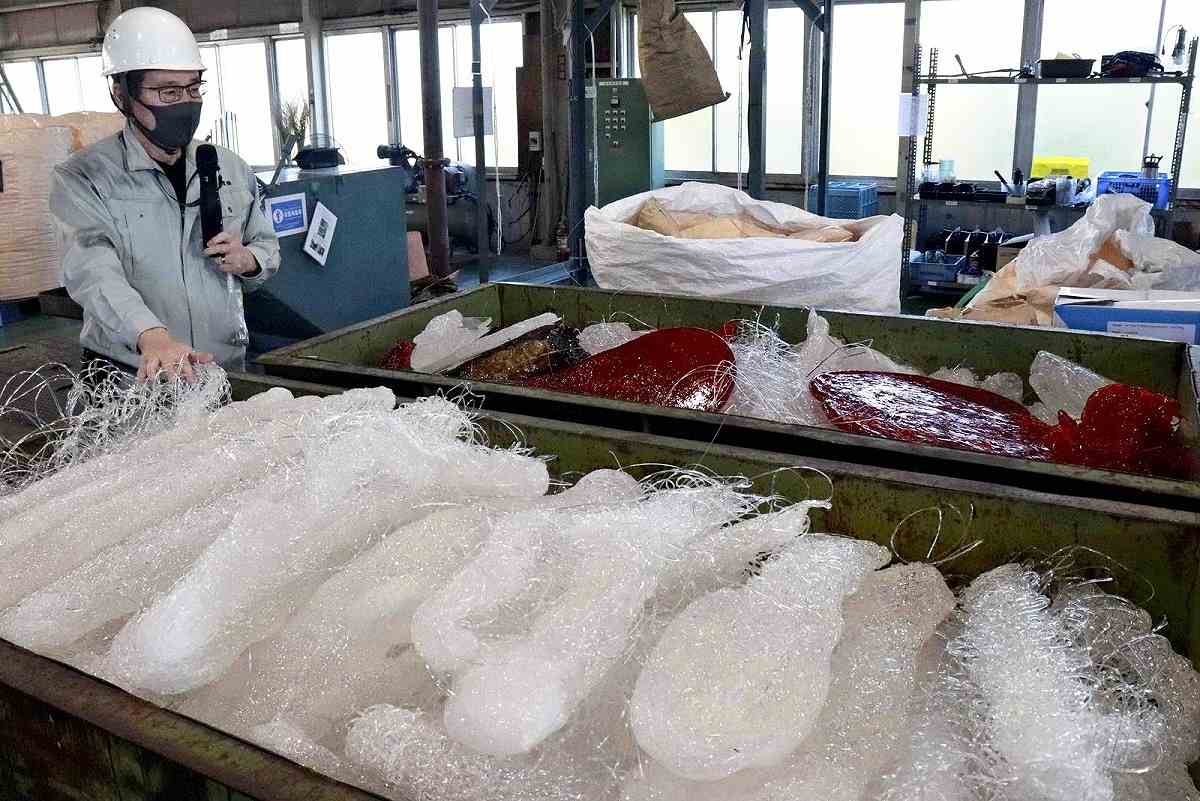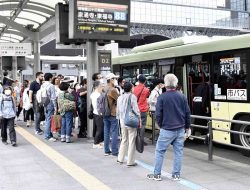Companies Expanding Use of Recycled Plastic; Technological Developments Improve Production Process, Allow Incorporation in Cars, Electronics

Plastic waste to be made into recycled plastic at Maruki Sangyo Co. in Takaoka, Toyama Prefecture, in October.
2:00 JST, November 24, 2024
At a time when the need to protect the environment is necessitating for decreases the production of new plastic and increases the reuse of existing material, major domestic manufacturers have begun putting greater focus on recycling plastic waste and developing related technologies.
Improvements in the quality of recycled plastic have widened its potential applications, prompting businesses to anticipate a wave of market growth and hurry to get ready to ride it.
Honda Motor Co. uses recycled plastic in the front grille and bumper of the light electric vehicle it released in October. Recycled plastic was previously only used in parts on the undersides of vehicles. This is the first time it has been used in parts that are clearly visible.
Home electronics maker Hitachi Global Life Solutions Inc. (Hitachi GLS) released a vacuum cleaner in September whose plastic parts are 40% recycled plastic by weight.
Sony Corp. released a soundbar speaker in June which is made of about 50% recycled plastic.
Plastic waste is crushed or sorted into different types to become recycled plastic which can serve as a material for new products. This process has also seen technological advances.
NEC Corp. has created a system which uses artificial intelligence to improve the efficiency of recycled plastic production. The system determines the volume of plastic and combination of resin and pigment needed to achieve the strength and color that a customer wants. In cooperation with Toyama Prefecture-based plastic manufacturer Maruki Sangyo Co., NEC taught its AI “recipes” based on the experiences and perceptions of workers.
Hitachi GLS, meanwhile, has developed a technology to clean plastic waste that has turned brown due to impurities. The now clear plastic material is used in interior parts of refrigerators, for which a sense of cleanliness is very important.
Research company Fuji Keizai Co. estimates that the domestic market for recycled plastic will expand from ¥172.7 billion in 2023 to ¥359.4 billion in 2035. The image of recycled plastic as dirty or of poor quality has faded, and competition to secure supplies of recycled plastic has also arisen.
“The competition [for recycled plastic] has driven up its unit price,” Hitachi GLS Executive Managing Director Hisanori Toyoshima said.
To encourage the use of recycled plastic, the government plans to require manufacturers that use large amounts of plastic to set numerical targets for the use of recycled plastic and report on how much they actually use. It aims to revise the relevant laws during an ordinary Diet session next year.
Overseas, companies such as Nestle S.A., in Switzerland, and Microsoft Corp. and Apple Inc., in the United States, have boosted plastic recycling through measures like setting numerical targets for use of recycled materials. If Japan can lead the way in plastic recycling technology, it will also lead to increased competitiveness in the global market.
“Technology should expand the use of recycled plastic even further,” Fukuoka University special research Prof. Shigeru Yao said. “However, excessive safety and security concerns among consumers are hindering its use. We need a revolution in mindset.”
Top Articles in Society
-

Producer Behind Pop Group XG Arrested for Cocaine Possession
-

Man Infected with Measles Reportedly Dined at Restaurant in Tokyo Station
-

Man Infected with Measles May Have Come in Contact with Many People in Tokyo, Went to Store, Restaurant Around When Symptoms Emerged
-

Woman with Measles Visited Hospital in Tokyo Multiple Times Before Being Diagnosed with Disease
-

Australian Woman Dies After Mishap on Ski Lift in Nagano Prefecture
JN ACCESS RANKING
-

Producer Behind Pop Group XG Arrested for Cocaine Possession
-

Japan PM Takaichi’s Cabinet Resigns en Masse
-

Man Infected with Measles Reportedly Dined at Restaurant in Tokyo Station
-

Israeli Ambassador to Japan Speaks about Japan’s Role in the Reconstruction of Gaza
-

Videos Plagiarized, Reposted with False Subtitles Claiming ‘Ryukyu Belongs to China’; Anti-China False Information Also Posted in Japan
























